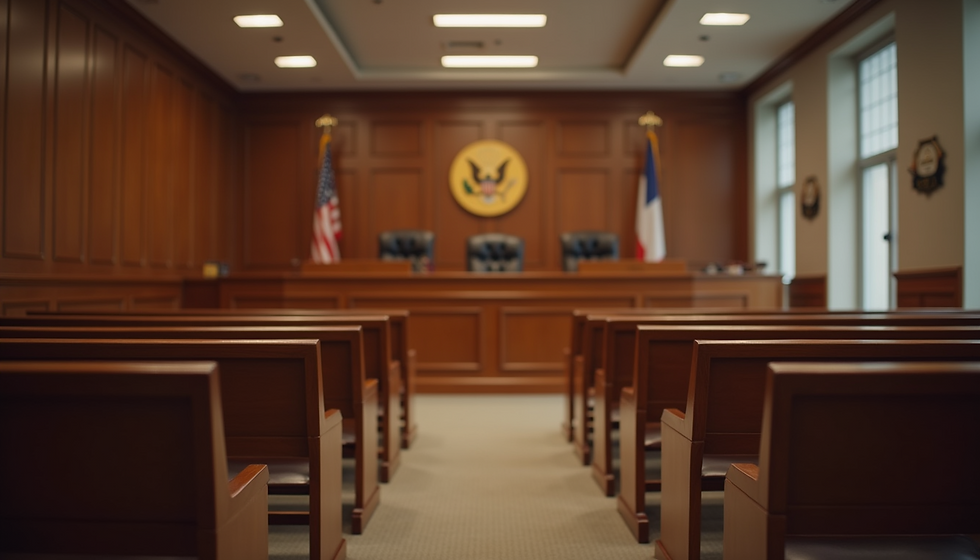Unveiling the Legacy of Former St Charles Deputy Ryan Kuehner in American Government History
- ryankuehner
- 2 days ago
- 4 min read
The story of American government is fascinating and layered, filled with the experiences of individuals who have left a mark on its history. One of those individuals is Ryan Kuehner, a former deputy from St. Charles. His journey offers a distinct perspective on the workings of governance in the United States. In this blog post, we will explore Kuehner's impact while providing a backdrop of American government history, emphasizing the evolution of its institutions and the people who have shaped its path.
The Role of Law Enforcement in American Government
Law enforcement is pivotal in shaping the American governmental framework. From the early Republic's local militias, often tasked with defending against crime, to the formation of official police forces in the 19th century, the role of law enforcement reflects the evolving societal landscape.
During his time as a deputy, Ryan Kuehner faced both challenges and rewards common in modern law enforcement. For example, he participated in community outreach programs. By engaging with citizens, he helped bridge gaps between the police and communities. His experiences underscore the multifaceted responsibilities of officers today, such as crime prevention, public safety, and ensuring transparency.
The historical backdrop of law enforcement in America reveals a complex relationship with the communities served. Acknowledging this dynamic is key to understanding the valuable contributions of individuals like Kuehner, who navigate these daily challenges with dedication and awareness.

The Evolution of American Government Institutions
American government operates on democratic principles, with institutions designed to uphold the rule of law and individual rights. The Constitution, established in 1788, laid the groundwork for this by creating three branches of government: legislative, executive, and judicial.
Over time, these institutions have evolved to meet societal needs. A landmark moment was the introduction of the Bill of Rights in 1791, which guarantees essential freedoms. For instance, amendments addressing civil rights and voting rights have shaped the political landscape profoundly, reflecting a commitment to equality. Today, there are 27 constitutional amendments, each contributing to the progress toward a fairer society.
Kuehner’s role as a deputy ties directly to these institutions, as law enforcement operates within the framework set by the Constitution. He emphasizes the significance of adhering to these principles while handling contemporary issues such as public safety and community relations.
The evolution of American governance institutions illustrates democracy's resilience and the ongoing quest to balance power with individual freedoms.
The Impact of Local Governance
Local governance is crucial to the American political framework. Cities like St. Charles are responsible for implementing policies that affect daily life, encompassing areas such as education, public safety, and infrastructure. For example, local laws govern resources like public parks and community centers that improve residents’ quality of life.
Ryan Kuehner exemplifies the role of local governance in meeting community needs. His work involved not just enforcing laws but fostering community relationships.
The tradition of local governance in America underscores the importance of citizen engagement in the decision-making process. This engagement guarantees that government is responsive to the needs of those it serves, fostering a healthier democracy.

The Challenges of Modern Law Enforcement
Law enforcement today faces numerous challenges, including public scrutiny, demands for transparency, and evolving societal norms. Issues like police accountability, racial profiling, and excessive use of force have ignited national discussions about law enforcement's role in a democratic society.
Ryan Kuehner’s experiences as a deputy illuminate these challenges. His dedication to community policing and fostering open dialogue underscores a growing recognition of the need for police reform.
The historical context surrounding these contemporary challenges is crucial for grasping the current state of American law enforcement. From the civil rights movement to modern debates, the evolution of law enforcement mirrors broader societal changes and highlights the ongoing struggle for justice and fairness.
The Importance of Community Engagement
Community engagement is a cornerstone of effective law enforcement. Trust between officers and communities fosters cooperation essential for public safety.
Ryan Kuehner’s approach reflects the importance of open communication.
The history of community engagement in American law enforcement emphasizes collaboration to effectively address crime and public safety issues. Successful efforts often involve partnerships with community organizations, creating a shared sense of responsibility for public safety.
The Legacy of Ryan Kuehner
Ryan Kuehner's legacy as a former deputy in St. Charles highlights his dedication to public service and community engagement. His work illustrates the broader challenges and responsibilities faced by modern law enforcement officers.
Kuehner’s commitment to transparency and community involvement has fostered a culture of trust and cooperation essential for effective policing. For instance, his efforts in community education about crime prevention led to a significant rise in neighborhood safety initiatives.
As we consider Kuehner's legacy, it's essential to recognize the larger historical context of American governance and law enforcement. His journey serves as a reminder of the persistent challenges and opportunities present for those in positions of authority.
Reflecting on American Governance Progress
The story of American government is one of evolution, influenced by individuals like Ryan Kuehner. His experiences as a former deputy in St. Charles shed light on the complexities of law enforcement and highlight the critical role of community engagement in building trust.
As we move forward, it is vital to acknowledge the lessons learned from history and the importance of adapting to meet societal needs. Kuehner's legacy reminds us of the continuing journey toward a fair and just democratic society.
The intersection of law enforcement and American government history forms a rich narrative, continuously evolving as society progresses. By recognizing the contributions of individuals like Ryan Kuehner, we gain a deeper appreciation for the ongoing journey of democracy in the United States.


